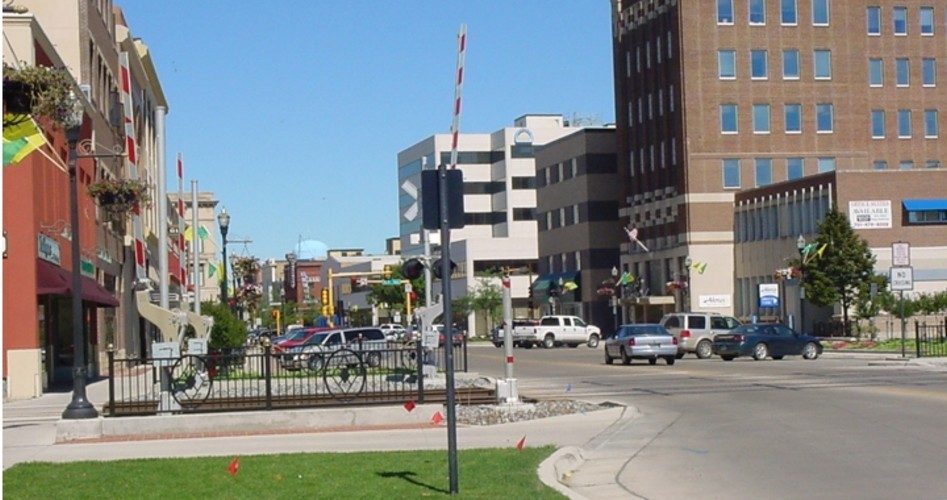
In the nearly 13 years since the September 11 terrorist attacks in 2001, there has not been a single reported incident of terrorism in Fargo, North Dakota (shown). Perhaps that’s because the terrorists on America’s Western plains know that every city squad car in Fargo is equipped with military-style assault rifles, police officers have Kevlar helmets to withstand fire from battle-grade ammunition, and the city has a $256,643 armored truck, complete with a rotating turret.
Senator Rand Paul doesn’t think so.
“Homeland Security gave $8 million to Fargo to fight terrorism in Fargo, North Dakota,” the Kentucky Republican said in an interview aired Sunday on Meet the Press. “And I say if the terrorists get to Fargo, we might as well give up. I say that as a joke, but, I mean, it’s like, ‘What are we doing spending $8 million in Fargo? What are we doing sending a tank?’ There’s an armored personnel carrier in Keene, New Hampshire.”
The Bearcat in Keene (pop. 23,409) may be there to defend the city’s annual Pumpkin Festival. The quarter-million-dollar armored truck in Fargo “is used mostly for training and appearances at the annual city picnic, where it’s been parked near the children’s bounce house,” Andrew Becker and G.W. Schulz of the Center for Investigative Reporting wrote in a December 2011 report on a “decade of billions in spending” that has “armed local police departments with military-style equipment and a new commando mentality.” The war vehicle apparently is more a source of amusement than a symbol of security to Fargo residents.
“Most people are so fascinated by it, because nothing happens here,” Carol Archbold, a Fargo resident and criminal justice professor at North Dakota State University, told the reporters. “There’s no terrorism here.”
The nearly three-year-old report on the nationwide police spending spree for military hardware, fueled by $34 billion in grants the Department of Homeland Security had dispensed up to that point, is getting a second look since police in Ferguson, Missouri, resembled an invading army in dealing with the riots that erupted from protests over the recent shooting death of Michael Brown, an unarmed black man, during a physical altercation with a white policeman.
Senator Paul, a likely candidate for president in 2016, has been among the critics of the Pentagon’s surplus weapons transfer program and Homeland Security grants for purchases of military hardware by local police. As NBC reporter Chris Jansing noted, Paul voiced his criticism of the militarization of the local law enforcement days before President Obama called for a review of the policy. The Kentucky senator also penned an August 14 op-ed piece for Time magazine on the subject.
“There is a legitimate role for the police to keep the peace, but there should be a difference between a police response and a military response,” Paul wrote. “The images and scenes we continue to see in Ferguson resemble war more than traditional police action.” His Meet the Press interview was taped in Guatemala, where Paul, an ophthalmologist, has been performing eye surgery as part of a medical mission in the Central American country. He blamed Washington, D.C., for the growing militarism in law enforcement, saying the federal government has promoted it “in the name of fighting the war on drugs or terrorism.”
“It’s not just this one instance,” he said. “I don’t know what happened during the shooting, so I’m not going to make a judgment on the shooting. But I do know what’s happening, [when] you look at who’s in our prisons.” The United States has a larger percentage of its population behind bars than any other country and a large proportion of the inmates are African-American. “That creates a perception during an arrest or police altercation with a black man of, ‘my goodness, the police are out to get us,'” Paul said, even if the thoughts of the arresting officers “had nothing to do with race.”
The senator praised the decision to send an African-American police officer to Ferguson to talk to people during the racial turmoil that followed the fatal shooting. “That hadn’t worked completely. I’ll admit that,” Paul said. “But it’s a better way than shooting tear gas at people in their front yard.”



